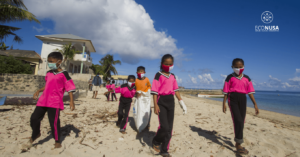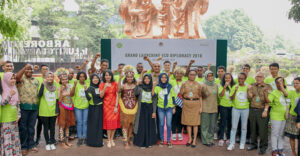
Several weeks prior to Idul Fitri, Regional Government in Papua and West Papua Provinces banned peoples not to perform any commemoration of Idul Fitri as it used to be. It is intended to prevent Covid-19 from spreading in Papua. Unlike the previous years, Idul Fitri in Tanah Papua does not perform any marching tradition for silaturahmi (communal bonding) due to pandemic.
Instead of performing such tradition, the government instructed the community to stay at home to prevent from contagion of Covid-19. The marching tradition for silaturahmi or commonly called Hadrat tradition has been performed by Papuan community from generation to generation. However, there is none this year due to pandemic. Takbir (recitation of praise) on Idul Fitri eve, colleague or relative visits, going back to homeland are prohibited because of pandemic.
In the previous years, community in Tanah Papua (the Land of Papua) such as that of in Kaimana, West Papua, normally performs marching tradition for silaturahmi or Hadrat from one village to another while playing rebana (traditional tambourine) and singing together. Along the marching path, the mob enjoys meal served in front of every local residence. In this tradition, the community forgives each other as the communal bonding. The similar tradition is also done by Abepantai community in Jayapura. The crowd marches while reciting praise the prophet, playing rebana and dancing for silaturahmi. The tradition is deemed a solid bonding of brotherhood among peoples in Tanah Papua.
It is not simply Moslem that joins the Hadrat tradition but also other believers. They come together to celebrate Idul Fitri merrily. Idul Fitri in Tanah Papua is identical to highly respected values of tolerance. Tolerance does not only happen during Idul Fitri but in the daily life of Papuan community.
According to Amiruddin Kamay, an Islamic teacher at Kambala Village, Kaimana, there are many families of one clan with different religion. However, the difference does never matter in daily life to help and care each other. “Despite the different religion, we live in harmony without any social tension. All humans are of the same family and harmony among different religious believers, individual and nations should be maintained,” said Amiruddin.
Zein Farisa also shared about religious tolerance in Tanah Papua. “In commemoration of Idul Fitri, relatives and neighbors of the different faith always come to have silaturahmi. Many of us are of one family with different faith. On Idul Fitri, they usually join the celebration with us with Hadrat marching tradition. When Christmas comes, it is our turn for all Moslems to join Christmas celebration. However, with the pandemic, we skip the Hadrat marching tradition for silaturahmi for safety and Covid-19 prevention,” said Zein as the notable religious leader in Bungsur, Kaimana, West Papua.
As to Zein, the community in Bungsur complies with the government and agrees not to hold any Idul Fitri tradition that garner many peoples, including ˆmarching tradition. There is also no marching for takbir tradition on the Idul Fitri eve. However, Ied prayer is allowed under the compliance of health protocol by wearing mask and physical distancing. This is done in a bid to prevent Covid-19 contagion in Tanah Papua from rising.
Based on data from the Ministry of Health, the Covid-19 positive cases as per 24 May 2020 in Papua Province are 556 cases and 130 cases in West Papua Province. There are 6 deaths in Papua and 2 in West Papua. On Idul Fitri, there are additional 62 new cases in Papua Province that leads Papua on the top three after Jakarta and East Java. A day before Idul Fitri, 26 health workers were confirmed to be positively infected by Covid-19 in Papua Province and are under medical treatment.
Zein said that religious rites at mosque did not involve many peoples. After Ied prayer, peoples went home for safety. Some others performed their rites at home. Alternatively, the silaturahmi was done by phone or short messaging. Families and relatives of different faith sent Idul Fitri greetings. “That is more than enough to make communal bonding amidst the situation. Hopefully the pandemic will end. All the peoples are safe and sound. That is the more important for now,” said Zein who performed Ied prayer at Nurul Falah Mosque at Kaimana.
Despite the absence of silaturahmi marching tradition in commemoration of Idul Fitri in Tanah Papua, the meaning of communal bonding the Land of Papua remains the same. Tolerance is the respected issue. The absence of physical encounter due to pandemic does not break off the social relation. Idul Fitri this year is not as usual. Doors remain closed and none pays a visit. But, the hearts of every people remain open for forgiveness and social bonding.
Editor: Leo Wahyudi




